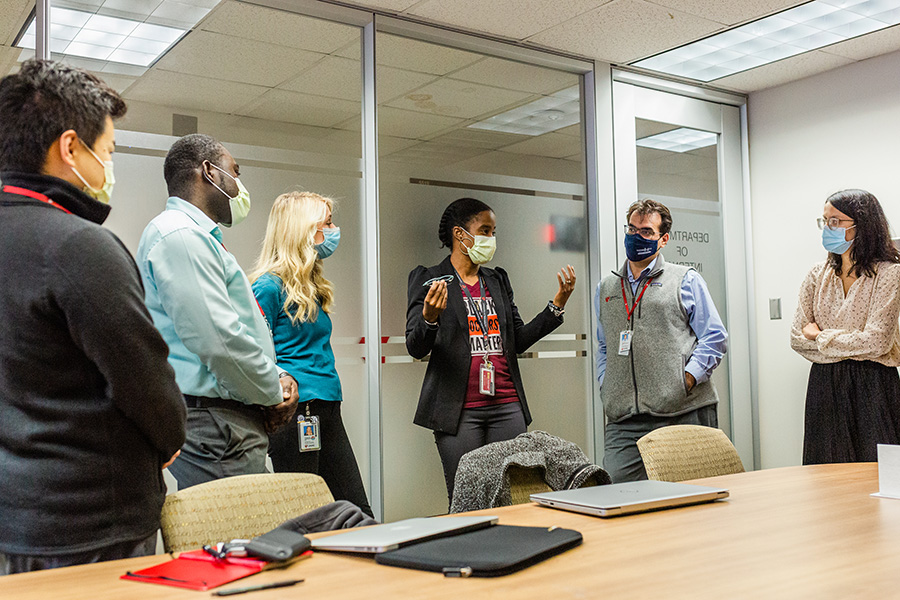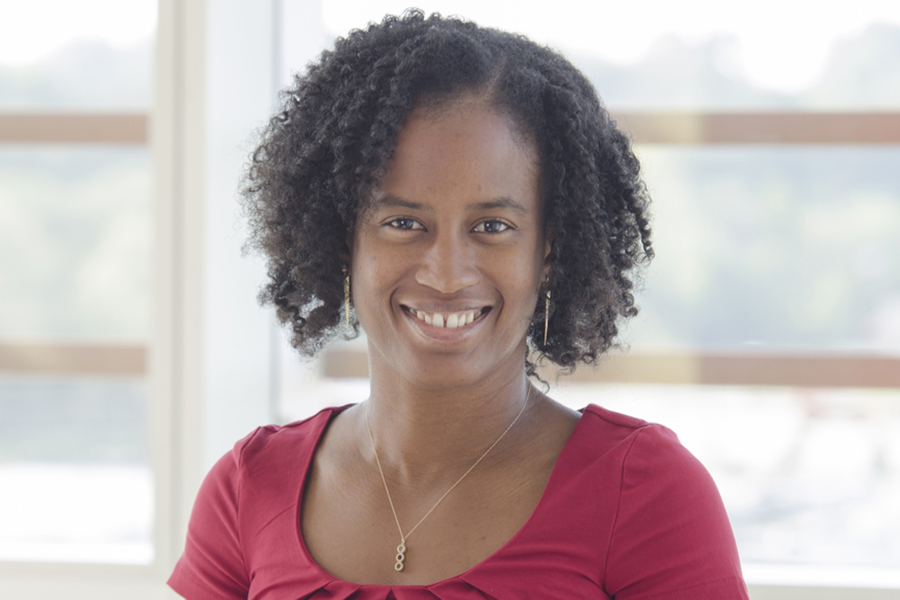Diversity, Equity & Inclusion
The Department of Internal Medicine at UNMC is committed to recruiting and supporting residents, fellows, faculty and staff from diverse backgrounds that represent the diversity of our patients and community. We are also committed to ensuring an environment that is inclusive and imbues a sense of belonging for historically excluded people including racial, ethnic and religious minorities, LGBTQ+ individuals, and people with disabilities.
The Developing an Inclusive and Varied Environment for Residents, Students, and Educators (DIVERSE) Council was established in January 2020 and is chaired by Dr. Jasmine Marcelin, residency associate program director.
The council, which includes students, residents, and faculty, was established with a mission: “To transform our residency into one that reflects the diversity of our patient population and ensure that our residency provides an inclusive environment for residents to succeed.”
We are committed to Developing an Inclusive and Varied Environment for Residents, Students and Educators. To achieve this, we will:
- Create an inclusive and welcoming environment where differences are embraced, valued, and respected,
- Ensure that processes, policies, and practices promote access, inclusion and equity,
- Guarantee transparency to promote fair treatment and equitable opportunities for all physicians, residents, students and applicants of UNMC’s Internal Medicine residency program.

DIVERSE Council Subcommittees
Our DIVERSE taskforce meets every other month and subcommittees work on projects in between meetings.
- Ensure an efficient, and reproducible system for equitable residency selection process
- Increase UNMC IM residency presence at regional and national conferences, such as Student National Medical Association (SNMA), National Hispanic Medical Association (NHMA) and Latino Medical Student Association (LMSA)
- Developed DIVERSE Taskforce Visiting Medical Student Externship Program
- Assess inclusion/belonging of current and former residents, and develop structural changes to address any themes discovered
- Start and continue discussions about inclusion within our residency program
- International Medical Graduate trainee group
- Participate in UNMC Summer Health Professions Education Program (SHPEP), share advice and recommendations with undergraduate students interested in medicine
- Exploring existing pipeline and mentoring programs for collaboration with residency program
- Developed antiracism resource card
- Regularly updating DEI resource web page
- Curating resources for Department of Internal Medicine bimonthly newsletter
- Plans to develop unconscious bias, structural determinants of health, and racism in healthcare curricula for residents and faculty (coming soon!)
- Reviewing residency websites and social media regularly to ensure content reflects goals, values, and guiding principles
Case Statement
The goal of the DIVERSE Council is to ensure that the UNMC Internal Medicine residency program reflects the diversity of our patient population and that our residency provides an inclusive environment for underrepresented/historically excluded residents to succeed.
Underrepresented/historically excluded groups include racial and ethnic minorities, first generation college graduates, LGBTQ+ applicants, applicants with disabilities, and applicants that come from a lower socioeconomic status.
Our mission statement is inspired by published data demonstrating that:
Teams comprised of individuals with varying perspectives, ideas, and backgrounds outperform groups of like-minded experts (1)
Patients report high levels of trust and satisfaction when their physician is of their same race (2)
Underrepresented minority (URM) and lesbian, gay, bisexual, and transgender (LGBT) physicians are more likely to be involved in practice, research, education, scholarship, service, and mentorship activities aligned with their identity (3-5)
DIVERSE will lead by example in the following ways:
Using a data-driven approach to assess and track diversity and inclusion in the residency program
Engaging with local community organizations to improve recruitment pipeline of underrepresented individuals
Identify and pursue opportunities to recruit underrepresented groups in medicine
Developing an ongoing structural determinants of health/unconscious bias educational program for residents and faculty
References
1.Page, SE. The Difference: How the Power of Diversity Creates Better Groups, Firms, Schools, and Societies (New Edition). Princeton University Press, 2007. JSTOR, www.jstor.org/stable/j.ctt7sp9c. Accessed 11 Mar. 2020.
2.Laveist TA, Nuru-Jeter A. Is doctor-patient race concordance associated with greater satisfaction with care? J Health Soc Behav. 2002 Sep;43(3):296-306.
3.Nivet MA. Minorities in academic medicine: review of the literature. J Vasc Surg. 2010 Apr;51(4 Suppl):53S-8S.
4.Sanchez JP, Poll-Hunter N, Stern N, Garcia AN, Brewster C. Balancing Two Cultures: American Indian/Alaska Native Medical Students' Perceptions of Academic Medicine Careers. J Community Health. 2016 Aug;41(4):871-80.
5.Sanchez NF, Rankin S, Callahan E, Ng H, Holaday L, McIntosh K, et al. LGBT Trainee and Health Professional Perspectives on Academic Careers--Facilitators and Challenges. LGBT Health. 2015 Dec;2(4):346-56.

Jasmine R. Marcelin, MD, FACP
Chair, DIVERSE Council
Associate Program Director, UNMC Internal Medicine Residency
Vice Chair, Internal Medicine Office of Equity and Inclusive Excellence
My personal mission statement, and why I created this taskforce: “To create and support a healthcare workforce and graduate medical education environment that strives for excellence and values Inclusion, Diversity, Access and Equity as not only important, but necessary, for excellence (success)”